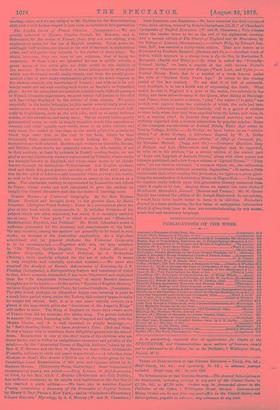The London Series of French Classics. (Longmans.) — We are
greatly indebted to Messrs. Charles Cassell, Th. Karcher, and L. Stievenard, for the series of French plays they are now editing, with explanatory notes for the use of English students. These notes, ex- ceedingly well written, are placed at the end of the book in alphabetical order, and will prove very valuable to the reader of these plays. We think, however, they are open to one criticism, that of being too numerous. If these hooks are intended for use in public schools, a great many of the notes give too little credit to the abilities of the teacher. Even for the student at home information is often given which any dictionary would easily supply, and from the purely gram- matical point of view many explanations given in the notes suppose in the student scarcely any knowledge of French ; and without it he evi- dently could not attempt reading such works as Racine's or Corneille's plays. As for the notes thnt are meant to explain really difficult passages or French idiomatic expressions, we must render full justice to the skill and knov ledge displayed by the editors of these classics. We notice especially in the books belonging to this series several really good and useful notes on words, the correct use of which is a matter of such diffi- culty to Englishmen, such as the verb eller, used in so many different senses, or the adverb ne, and many more. But as we said before, purely grammatical notes, or such as simply translate words like cependant cercueil, and other equally easy words, seem to us quite useless, and only cause the reader to lose time, as the words printed in prominent black type refer him to the end of the book, where he then frequently finds information not worth looking for. The plays themselves are well selected. Besides such writers as Corneille, Racine, and Moliere, whose works are generally known in this country, if not In their entirety, at least by extracts in French reading-books, wo are glad to see the eighteenth century represented by Voltaire, whose works are scarcely known in England, and whose name seems to be chiefly known through its derivative—Voltairianism. Let English students read and study this great genius, and they will be filled with admira- tion for the spirit of tolerance and humanity which pervades his works, as well as for the generosity which marks so many of his actions as a man. The nineteenth century is represented by Lamartine and Alfred de Vigny, whose works are well calculated to give the student an insight into French literature and also the desire of knowing more.


































 Previous page
Previous page